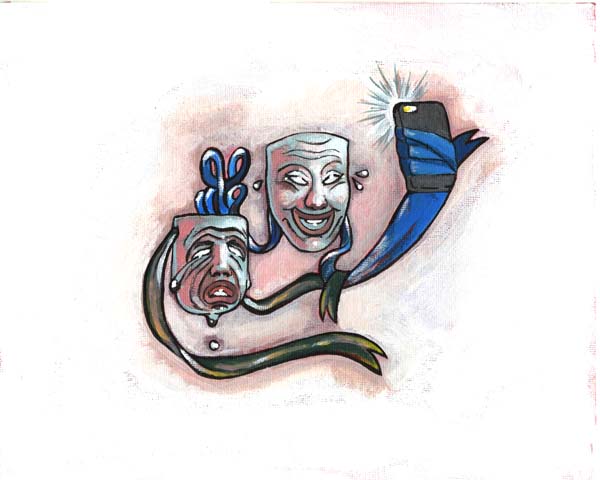Can the Beggar Forget Himself?
Illustrated by Colin Abbott
Shakespeare is sometimes hard to keep fresh. He wrote that “all the world’s a stage,” but we have heard this phrase so often that its radical meaning can sometimes be lost. If all life truly is a performance, who, then, is watching? Can you, as an audience member, maintain an outside perspective on the story unfolding before you, or are you inevitably a part of the story?
 To put this question another way: what makes you a person vs. a character? Is it your hat or pair of shoes? Is it your job or your relationship? If these markers of identity were all stolen and given to someone else, who would you be? Who would the thief become? What does it mean to be an audience—and is it even possible to sit, observing, outside the drama—at a time when almost all art is so thoroughly interactive? Even in Shakespeare’s own time, at the Globe, it was not uncommon for a speaker to address the crowd directly, making them part of the performance. Throwing rotting fruit back is generally frowned upon these days, but suffice it to say that theatre, this inherently voyeuristic art form, has always been more of a two-way street than we might like to admit.
To put this question another way: what makes you a person vs. a character? Is it your hat or pair of shoes? Is it your job or your relationship? If these markers of identity were all stolen and given to someone else, who would you be? Who would the thief become? What does it mean to be an audience—and is it even possible to sit, observing, outside the drama—at a time when almost all art is so thoroughly interactive? Even in Shakespeare’s own time, at the Globe, it was not uncommon for a speaker to address the crowd directly, making them part of the performance. Throwing rotting fruit back is generally frowned upon these days, but suffice it to say that theatre, this inherently voyeuristic art form, has always been more of a two-way street than we might like to admit.
Such themes—identity, personhood, what we owe to those who entertain us and how our perspectives might be bound up in the drama ourselves—are at the very heart of what it means to be an artist right now and to enjoy and consume media in general today. It is also at the forefront of Dawson Theatre’s first major production of the 2018-19 season: Shakespeare’s The Taming of the Shrew, subtitled by director Carolyn Guillet as Shaming of the True?
This production features several old men, a cowgirl drag-king, a broken bass guitar, and two plastic lobsters, but as always at the center of its story are two sisters, Bianca and Katerina, who could not be more different. The younger is sweet and beautiful, while her older sister is famous all over Italy for her foul mouth and worse temper. Poor Bianca, then, because her father has decreed that she cannot be wed until her headstrong sister gets married first. Enter Petruchio, the only man in Padua who cares more about money than about having a calm and caring wife.
At at time when traditional perspectives on gender are being called into question, this production’s innovative take on the 400 year old classic comedy (yes, comedy!) on the merits of spousal abuse has an almost entirely gender-flipped cast. The costumes range from stitch-perfect period dress to 1920’s butler attire and beyond. This, coupled with the sparse set and wine-fueled framing device about a man named Sly auditioning for the play we are presently attending, allows for perspectives of gender, social class and audience/actor to be transgressed fluidly and with expert comedic panache.
Guillet’s interpretation gives lie to the perspective that there is any fourth wall left to hide behind in theatre, or in the rest of the world. We, the audience, are invaded and provoked into asking ourselves some very profound questions about the nature of our identity and how we then connect to those around us. Both casts (oh, did I mention it is double cast? It is. You should come for both!) elevate the text from its centuries-old beginnings to an uproarious night of hijinks, mistaken identity, and unexpected pathos.
The Taming of the Shrew begins previews at 7:30 pm Monday, November 12th and Tuesday the 13th.
- Opening at 8pm Wednesday November 14th
- Playing at 8pm November 14th to 17th and November 22nd to 24th
- Matinées at 12:30pm on Wednesday November 14th, Friday November 16th, and Thursday November 22nd
See you at the theatre.

Comments
No comments posted yet.
You have to be registered and logged in in order to post comments!